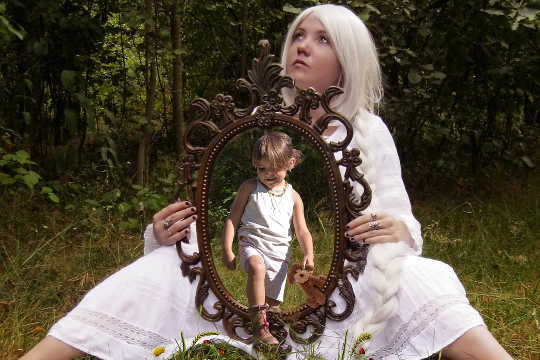
Image by ATDSPHOTO
We need to examine the spells that hypnotize us and break them when they hinder us. Spells are words, deeds and judgements that go unquestioned, undigested and unchallenged. It could be a doctor informing you that you have three months to live, a friend saying your marriage won’t work, your mind telling you that you will never find success, or an astrologer saying that your future is doomed. They fuse with our unconscious mind and are the root cause of some of our heaviest life patterns.
At a societal level we become hypnotized by the news, becoming obsessed by the issue of the day. Pro or anti, who’s right and who’s wrong? A mob mentality can form because people unquestioningly parrot the opinions fed to them by the media.
The hard work of becoming conscious and the willingness to self-reflect are the only ways to escape the domination of this treacherous magic that weaves itself into the fabric of our souls.
Experience Anger, Hurt, Betrayals... Then Move On
At a micro level we may tell ourselves that our mother and father ruined our lives. On the first weekend of my first group therapy training, a woman did a role play in which she shrieked abuse at the participant playing her mother. Her pain was visceral, her anger was magnificent. I was impressed by her ability to plumb the depths of her history. However, at the end of two years of group work she was still trotting out the same fury, and her belief that her mother was the architect of her misfortune had not altered one bit.
We need to experience our anger, hurt and betrayals, but if at some point we are unable to move on from our screaming child inside and integrate them with our internal adult, the pain will hold us endlessly in its thrall. We might gain temporary relief and catharsis, but we’ll never truly break the spell.
When we blame parents or politicians, we are powerless in the face of a spell. We need to face our history and patterning with an open mind and heart and be willing to reframe our future. As a child, we had few choices, but as adults we have to find our way into responsibility, understanding, acceptance and a willingness to move on.
Labels Can Cast Far-Reaching Spells
The language we use around mental health is particularly potent and casts far-reaching spells. To be told by a doctor, a person of power, someone you trust implicitly, that you are “schizophrenic” or “bipolar”, have a “depressive” or “trauma-related illness”, is to permanently affect your image of yourself. This is a profound theme at the Compassionate Mental Health gatherings. Many of the facilitators there had received a mental health diagnosis. They had often unconsciously embraced the terminology given to them by their doctors or psychiatrists and become the very essence of schizophrenia or bipolar or multiple personality disorder, almost as if, once labelled, they transformed into the dictionary definition of their “illness” and had little insight into how to reclaim their noble selves.
At an early meeting I attended, one of the presenters invited all of us to refuse to use labels around mental ill health. I ran a workshop called “Telling Our Stories”, where I encouraged participants to tell the uncensored version of their lives with the intention of meeting them with love and acceptance, wherever they may be. As I listened to them share their rawest and most painful stories, crucially not labelled or interpreted by anyone in the room, they became hopeful and optimistic, and some powerful spells were significantly weakened.
One man who had been labelled sexually abusive by a professional was able to recognize that this was untrue, and the terrible weight that he’d carried for years, thinking that he was a monster, had lightened in a moment. He became someone who could look people in the eyes and dare to speak his complex truth, knowing he would be met with compassion.
We are so keen to categorize. We rarely realize that to declare someone schizophrenic often means adding an extra layer of weight on top of whatever struggle is going on inside them. Labels are not useless – used with the right intention they do not have to cast spells. But what I am pointing out is that by creating a box to fit something in, and shutting someone in that box, there is little room for ever getting free.
Oscar
Oscar’s behaviour was weird and his relationships lacked boundaries. He would make inappropriate comments to women. He would fall asleep in the therapy room while someone else was working. His feedback was long, rambling and disconnected. He was so desperate to be liked that he presented a false, people-pleasing persona, again and again. He smiled a lot, even if he was disengaged.
During the course of one of my groups Oscar was diagnosed with ADHD. He was palpably relieved. At last, there was an identifiable reason he did what he did!
“I’ve got ADHD,” he would smile, as if that made everything alright. The group were having none of it. They refused to let him hide behind his label, meeting his excuses with an unshakeable wall of tough love.
This was hard on Oscar. He kicked and screamed, and almost left the group. He felt he’d been given a free pass with his diagnosis. His behavioural traits had become justified. He had tantrums, he got angry, he cried, he was self-pitying. None of it worked.
This is not a criticism of an ADHD diagnosis. In Oscar’s case he was using it to disclaim responsibility for his actions. The group fought long and hard to engage with him for who he is, and to challenge him to make the learnings that were necessary in order to hold himself to account. To give Oscar credit, over time, he tentatively released his label. By the end of the year, he had made the choice to take himself on.
He began to recognize the moment of activation of his blame pattern. Rather than try to be liked, he forced himself to be more real. He would catch himself and refrain from speaking the inappropriate comment. Interestingly, and seemingly coincidentally, his marriage also improved, and although Oscar couldn’t correlate the two, it was clear to me that what goes on in the group also manifests in the outside world.
Oscar realized that, at any moment, he had a choice to abdicate responsibility and play out the same-old, same-old, or to take responsibility for his actions and break the powerful spell that he called ADHD.
Denise
Denise was in her early sixties when she joined one of my groups. She constantly smiled. According to her, everything was fine and dandy. She insisted that life was easy and working well. Negativity didn’t get a look in.
She was highly attractive as a teenager, and still is, and had enjoyed her looks and sexuality, having many relationships and two marriages. In the early stages of the group she showed up as flirtatious and full of bonhomie. She was seductive, often giggling and speaking in a feathery and soft vocal intonation (especially when speaking to the men). She usually wore provocative clothing.
She was driven by her sexuality. She naturally charmed and seduced people, which brought her a temporary sense of power and engagement. However, in my opinion, allowing her sexy sub-personality to take the lead meant she avoided any dialogue that might have depth and didn’t have to truly engage with others. There was so much more to her than that.
“I love being sexy and I love having sex,” she used to say. But as we age, the currency of our sexuality becomes, of necessity, less important. Something in her must have known that she needed to find alternative avenues.
Her marriages were unhappy because sex can only carry you so far. Her husbands were strong men, whom she supported loyally, but both were threatened by her power and intelligence. Both men took her for granted, and while her first husband was physically abusive, her second, on occasions, was verbally so, which held her back from living her true potential.
As William Blake states, “The road of excess leads to the palace of wisdom.” She had lived out this part of herself until it had become untenable. Things came to a head when one day in the group she received some strong feedback from another woman.
“I don’t get it. You’re so inauthentic. I don’t care about this ‘I’m so sexy’ thing. You’ve got a lot going on. Why won’t you let us in?”
I then challenged her: “You have a mask and a cloak on – what are you hiding?”
She burst into tears, cried for a while, and once she’d let go she let us know some of her struggles. Since she was a child, Denise had trained herself not to show any tears or anger, especially as her mother had suffered from a few breakdowns and she felt responsible for her. As the eldest of three children, she’d been the bedrock of her family. What she’d just done was unheard of for her.
Soon after this sharing, her second husband died. She then developed some heart problems and was shaken to the core. He had been the love of her life, and although he hadn’t always treated her well, there had been a real heart connection between them. Although they had split up twelve years earlier, their love had never died. On his deathbed, he said, “If I could have changed anything in my marriage, I would have allowed you to be yourself.” This powerful loss propelled her into showing more of her emotions.
In breaking the spell of playing the sexy, happy woman, she realized that not only were her feelings acceptable, but she could open herself to a depth of heart connection that she was unknowingly starving for.
She formed close friendships within the group and engaged with creative pursuits that had always been a part of her life. Once her veils had been removed and her confidence in her achievements grew, she was propelled forward into becoming a professional sculptor.
Fascinatingly, her sculptures were all sensual images, and they were beautiful. She had managed to bring her sexuality into a different sphere and to use it in a way that was nourishing for herself and others.
Denise learned to respect her vulnerability. Her fear had been that if she showed her weakness she would be rejected. She had reached her sixties without ever really showing her true depths to another human being. She told me: “My heart problems changed the course of my life.”
Without knowing why she had joined the group, she finished it having created an arena in which she could be her full self, and after a long and challenging, but loving, process, she flourished.
Exercise: Identify and break your spells
What are the stories that you believe about yourself that cause your discomfort and distress?
What are the stories you believe about others that make you feel victimized by their behaviour?
What are the recurring themes in the challenges that you encounter?
Which problem recurs endlessly?
Write down five of these stories. Choose the ones that have the most charge for you, those you respond to with strong emotion or avoidance.
Write down the times you’ve made decisions influenced by these negative beliefs and any way you can see they have made your life more difficult.
What might you have done differently?
Once you have listed everything, choose a different set of beliefs for each challenge. Imagine you are a film director. You are creating a heroic character, a true warrior, and what he understands is that life is not a series of blessings and curses, but a series of challenges. It is our own labels that impact us and act like kryptonite, weakening our self-belief and our capacity to fully live.
For example, if you believe your wife or husband doesn’t love you, and therefore see yourself in a loveless marriage, notice the ways in which they show their appreciation and their love. Keep a keen eye out for that which you ignore and fail to value.
If you believe that your work is unsatisfying, make a list of the things that are essential in order for you to live a fulfilled work life, and then examine what it’s possible for you to change. Allow yourself to ruthlessly look the issues straight in the eye, and decide whether you need to start searching for a different place to use your skills.
If you believe your sex life is inadequate, and you have a partner, dare to have an honest conversation with them about what’s working and what you feel needs to change.
Break the spell of same-old, same-old. Make a pledge with yourself to let in your new set of beliefs, and make them a practice. Consider what support you need in order to do that.
Practice consciousness around your judgements. Every time you make a judgement about something, be vigilant. Ask yourself whether that judgement is accurate or not. Be willing to loosen your tight grip on that belief.
For example, you might think, “I’m fat.” But are you fat? Are you unhealthily overweight? If so, then are you willing to take on a practice that can change that spell? Or are you so self-critical that you’ve bought into the spell of the glamour magazines, of aspiring to the perfect body, knowing that you will never match it, lowering your self-regard in the process?
Maybe you tell yourself you’re stupid. Intelligence manifests in many different ways. Your IQ may not be in the Mensa range, but you may have a highly sensitive, intuitive knowing. Notice the people who you see as intelligent and recognize that they too have gaps in their wisdom.
Our sense of wellbeing is a barometer as to whether our beliefs are serving us. We know a spell has been broken when there is a release of energy and a sense of relief and happiness around a particular scenario. Sometimes we may need to remove ourselves from unhealthy situations in the recognition that the essence of who we are doesn’t match the environment we’ve created. Each lifetime has many incarnations, and as we go through our experiences, we get to rewrite the script.
©2020 by Malcolm Stern with Ben Craib. All Rights Reserved.
Excerpted with permission f the publisher, Watkins,
an imprint of Watkins Media Limited. www.WatkinsPublishing.com
Article Source
Slay Your Dragons With Compassion: Ten Ways to Thrive Even When It Feels Impossible
by Malcolm Stern and Ben Craib
 Ten key teachings from renowned therapist Malcolm Stern. The book, which includes many exercises, is the distillation of over thirty years' experience in the therapy room and shows us that meaning can exist even in the worst tragedy. By creating a set of practices and making them central to our lives we can find passion, purpose, and meaningful happiness while navigating life's darkest moments in such a way that we discover the gold hidden within.
Ten key teachings from renowned therapist Malcolm Stern. The book, which includes many exercises, is the distillation of over thirty years' experience in the therapy room and shows us that meaning can exist even in the worst tragedy. By creating a set of practices and making them central to our lives we can find passion, purpose, and meaningful happiness while navigating life's darkest moments in such a way that we discover the gold hidden within.
For more info, or to order this book, click here. (Also available as a Kindle edition and as an Audiobook.)
Another Book by this author: Falling in Love, Staying in Love
About the Author
 Malcolm Stern has worked as a group and individual psychotherapist for nearly 30 years. He is co-founder and co-director of Alternatives at St James's Church in London and teaches and runs groups internationally. His approach involves finding where the heart is and helping individuals access their truth. His London One Year Group is the centrepiece of his work and has been successfully operating since 1990. In it he creates an environment of trust, integrity and community, where participants can become skilled in relationships, communication and managing difficult conversations. The ultimate learning is to Slay your dragons with compassion. Visit his website at MalcolmStern.com/
Malcolm Stern has worked as a group and individual psychotherapist for nearly 30 years. He is co-founder and co-director of Alternatives at St James's Church in London and teaches and runs groups internationally. His approach involves finding where the heart is and helping individuals access their truth. His London One Year Group is the centrepiece of his work and has been successfully operating since 1990. In it he creates an environment of trust, integrity and community, where participants can become skilled in relationships, communication and managing difficult conversations. The ultimate learning is to Slay your dragons with compassion. Visit his website at MalcolmStern.com/


























